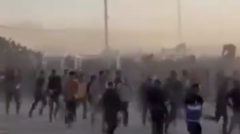The first trial of its kind is underway in Zaporizhzhia, Ukraine, as Russian soldier Dmitriy Kurashov faces charges for allegedly executing a Ukrainian prisoner of war. This case highlights Ukraine's commitment to prosecuting war crimes, even as Kurashov argues he was following orders in a war marked by brutality on both sides.
Landmark War Crimes Trial: First Russian Soldier Faces Charges for Battlefield Execution

Landmark War Crimes Trial: First Russian Soldier Faces Charges for Battlefield Execution
Dmitriy Kurashov stands trial in Ukraine, marking a historic moment in the prosecution of war crimes amidst the ongoing conflict.
In a groundbreaking trial set to reshape the narrative of accountability in warfare, Dmitriy Kurashov, a Russian soldier, has become the first to face war crimes charges in Ukraine for an alleged battlefield execution. The case is particularly notable given the ongoing conflict marked by severe casualties and accusations of war crimes from both sides.
January 2025 saw Kurashov appearing in a modest courthouse in Zaporizhzhia, flanked by armed guards and a trained dog, marking a depressing reality of the war still ravaging the region. He stands accused of executing veteran Ukrainian soldier Vitalii Hodniuk, who had attempted to surrender. The trial sheds light on broader perspectives surrounding the war, where Russian troops are said to have executed at least 124 captured Ukrainians since the beginning of the invasion.
Witness testimonies from Kurashov's own military unit have intensified the complexities of the case, further complicating the already fragile ground between criminality and warfare. Three witness testimonies shared during the trial indicate that Kurashov allegedly fired upon Hodniuk as he was surrendering, a crime under international law that prohibits the execution of surrendering soldiers.
Impacts of the trial reach beyond Kurashov himself; it is surrounded by a backdrop of increasing reported executions by Russian forces, creating an urgent need for accountability through legal avenues. Despite discrepancies in witness testimonies and accusations of bias due to the context of potential grievances, Ukrainian officials have gathered a significant volume of evidence portraying the gravity of Kurashov's actions.
As the trial unfolds, Kurashov, who had previously reported being coerced into military service after years spent in prison, highlighted the atmosphere of violence and disregard for the rules of engagement during his time in combat. He claims inadequate training led him to be poorly prepared for the moral implications of warfare, pleading guilty under the belief that this might expedite the proceedings and facilitate his return to Russia.
This significant trial underlines Ukraine's struggle against war crimes, aspiring to lay bare the harsh realities of the conflict while also addressing the persistent question of justice and accountability. If convicted, Kurashov faces a life sentence in Ukraine, adding an additional layer of complexity to the region’s existing prisoners' dynamics and ongoing negotiations for peace—all amid an overarching war marked not only by loss but also the call for justice.


















